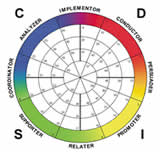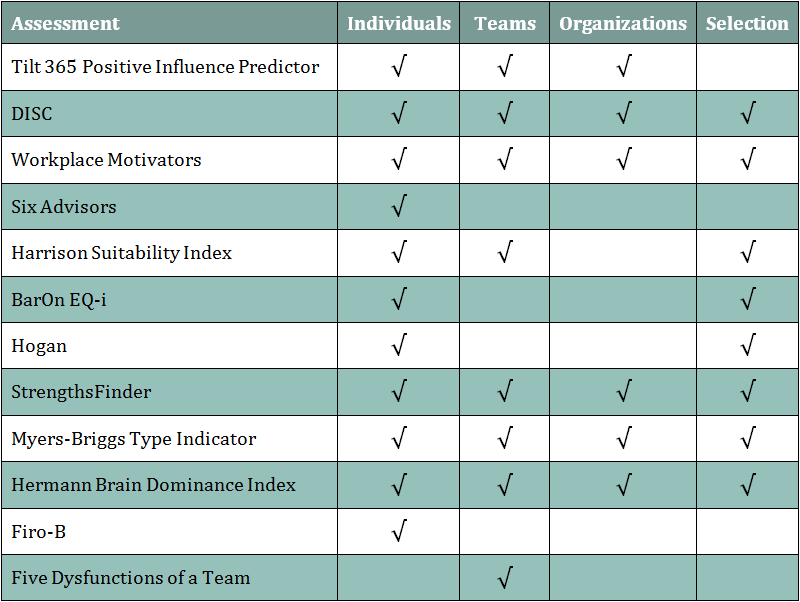Assessments
“There are so many assessments to choose from. How useful are they, and how do we know what’s best to use when?”
Keys to Success: Relevance & Applicability
To get to this point in your career, you’ve had to be able to understand yourself, other people and the dynamics of situations you find yourself in. And there’s always more to learn. Well-designed, validated assessments that are relevant to your needs not only add to your insight, they also help identify what strengths are available to you, your team or your organization, what improvements might be called for, and most importantly, how to go about using the former to work on the latter.
Because assessments are so useful, a lot have been developed and more are introduced every year. Choosing which are appropriate for the situation requires expertise and experience. Below are the assessments I’ve chosen to use most often. They’re based on solid theoretical models, and the reports are easy to grasp. The information you get is straightforward, helping to pinpoint ways to develop yourself, improve your team’s functioning, or match an individual to a role. Like most assessments, each of these is taken online and requires no more than 30 minutes to complete.
 |
Tilt 365 Positive Influence PredictorAs a leader, more of what you accomplish is through influence. So the perceptions others have of you are your reality, and understanding them is critical to your leadership development. The Tilt 365 Positive Influence Predictor reveals your strengths and gaps in the 48 leadership traits you need to establish credibility, relationships, respect and motivation, and to become a leader others follow. Click here to learn more about the Tilt 365 Positive Influence Predictor. |
 |
DISCThe DISC assessment helps you understand your own behavioral styles and work environment preferences so you can be more mindful of how your actions affect others. When everyone on your team takes the DISC, you learn what value each of you brings to the group, as well as ways to accommodate each other’s styles. This awareness can eliminate a lot of confusion, frustration and general dysfunction. Click here to learn more about the benefits of the DISC Assessment. |
 |
Workplace MotivatorsThe DISC shows you how you tend to do things. The Workplace Motivators assessment tells you why. You learn what drives you to work hard at something and what you look for in a situation to make it better. When you and your colleagues understand what motivates each other, conflict can actually become healthy and fruitful. Click here to learn more about how the Workplace Motivators Assessment can help you and your team. |
 |
Six AdvisorsMany of the choices you make every day are influenced by habitual messages you send yourself. Most of the time these thoughts are helpful; sometimes they get in your way. The Six Advisors assessment helps you see where your automatic thoughts are balanced and where they may not be so you can choose whether to heed their advice or not. |
 |
Harrison Suitability AssessmentIf a candidate with the right skills and experience is also suitable to the role – based on personality traits, interests, preferences of tasks and work environments, you can be more confident that it’s a fit. The Harrison Suitability Assessment is used in selection, development and team composition, by matching the individual with the demands of a particular role and assessing the impact of any gaps. |
 |
BarOn EQ-iResearch shows that your IQ, or cognitive intelligence, has less bearing on your leadership success than does your EQ, or emotional intelligence. The BarOn EQ-i 360 and self-assessment reports help you understand your EQ strengths and what you can work on to become a more effective leader. |
Uses
The table below shows how these and additional useful assessments can be used.


